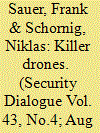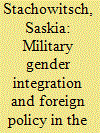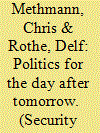|
|
|
Sort Order |
|
|
|
Items / Page
|
|
|
|
|
|
|
| Srl | Item |
| 1 |
ID:
114596


|
|
|
|
|
| Publication |
2012.
|
| Summary/Abstract |
This article sets out to probe the peculiar nexus between democracy and the military use of unmanned systems. To this end, it draws on a critical, 'antinomic' reading of democratic peace theory. Tying into the theoretical scope of research conducted within the democratic distinctiveness programme that emerged out of the democratic peace debate, this entails fathoming out the ways in which democracies are distinct from other regime types. It includes acknowledging that democracies deal with conflicts aggressively too, rather than naïvely taking their supposed general peacefulness at face value. We demonstrate that the same distinctly democratic set of interests and norms that is conventionally taken to be pivotal for democratic peacefulness yields both peaceful and belligerent behavior. That same democracy-specific set of interests and norms is also constitutive of the special appeal unmanned systems hold for democracies. While armed and eventually autonomous systems may thus seem like a 'silver bullet' for democratic decisionmakers today, we argue that, by relying on these systems in an attempt to satisfy the said interests and norms, democracies may end up thwarting them in the long run and render themselves only more war-prone.
|
|
|
|
|
|
|
|
|
|
|
|
|
|
|
|
| 2 |
ID:
114593


|
|
|
|
|
| Publication |
2012.
|
| Summary/Abstract |
The article investigates the relevance of foreign policy discourse and practice for military gender relations. The link between women's status in military institutions and the gendering of foreign policy has so far not been thoroughly addressed in military and gender research or foreign policy analysis. Feminist international relations provides a research strategy to show how foreign policy doctrines and debates are gendered and how they are connected to gender (in)equality in central state institutions such as the military. The article thus applies feminist international relations as a theoretical framework that transcends the constructed dichotomy between national and international levels of analysis. In a case study of the USA from the Clinton to the Obama administrations, patterns of military gender integration are established as a phenomenon incorporating both domestic and international dimensions. Foreign policy discourses and practices in this time period are related to shifts in military gender policies and discourses on gender integration. It is argued that the gender order in military institutions is linked to international politics and state behaviour in the international arena.
|
|
|
|
|
|
|
|
|
|
|
|
|
|
|
|
| 3 |
ID:
114594


|
|
|
|
|
| Publication |
2012.
|
| Summary/Abstract |
The recent global climate change discourse is a prominent example of a securitization of environmental issues. While the problem is often framed in the language of existentialism, crisis or even apocalypse, climate discourses rarely result in exceptional or extraordinary measures, but rather put forth a governmental scheme of piecemeal and technocratic solutions often associated with risk management. This article argues that this seeming paradox is no accident but follows from a politics of apocalypse that combines two logics - those of security and risk - which in critical security studies are often treated as two different animals. Drawing on the hegemony theory of Ernesto Laclau and Chantal Mouffe, however, this article shows that the two are inherently connected. In the same way as the Christian pastorate could not do without apocalyptic imageries, today's micro-politics of risk depends on a series of macro-securitizations that enable and legitimize the governmental machinery. This claim is backed up by an inquiry into current global discourses of global climate change regarding mitigation, adaptation and security implications. Although these discourses are often framed through the use of apocalyptic images, they rarely result in exceptional or extraordinary measures, but rather advance a governmental scheme of risk management. Tracing the relationship between security and risk in these discourses, we use the case of climate change to highlight the relevance of our theoretical argument.
|
|
|
|
|
|
|
|
|
|
|
|
|
|
|
|
| 4 |
ID:
114595


|
|
|
|
|
| Publication |
2012.
|
| Summary/Abstract |
The critical security studies literature has been marked by a shared commitment towards the politicization of security - that is, the analysis of its assumptions, implications and the practices through which it is (re)produced. In recent years, however, politicization has been accompanied by a tendency to conceive security as connected with a logic of exclusion, totalization and even violence. This has resulted in an imbalanced politicization that weakens critique. Seeking to tackle this situation, the present article engages with contributions that have advanced emancipatory versions of security. Starting with, but going beyond, the so-called Aberystwyth School of security studies, the argument reconsiders the meaning of security as emancipation by making the case for a systematic engagement with the notions of reality and power. This revised version of security as emancipation strengthens critique by addressing political dimensions that have been underplayed in the critical security literature.
|
|
|
|
|
|
|
|
|
|
|
|
|
|
|
|
| 5 |
ID:
114592


|
|
|
|
|
| Publication |
2012.
|
| Summary/Abstract |
This article explores the way in which female agency in political violence is enabled through gender. It looks at two examples of heroine stories - the cases of British Navy sailor Faye Turney and the popular film Female Agents (2008) - to illustrate how female agency in political violence is constructed at the expense of motherhood. The article argues that representations of female agency in political violence involve a tension between a life-giving and a life-taking identity, and that agency is only enabled if this tension is removed or overcome. This suggests that heroism, as agency in political violence, is in a symbiotic relationship with motherhood: heroism functions as motherhood's constitutive other and vice versa. This means not only that the writing of heroines depends on ideas about female bodies' association with motherhood but also that essentialist ideas about gender are reinforced. Accordingly, this article suggests that female agency in political violence is communicated and negotiated through motherhood, even in cases where this might not be immediately apparent.
|
|
|
|
|
|
|
|
|
|
|
|
|
|
|
|
|
|
|
|
|